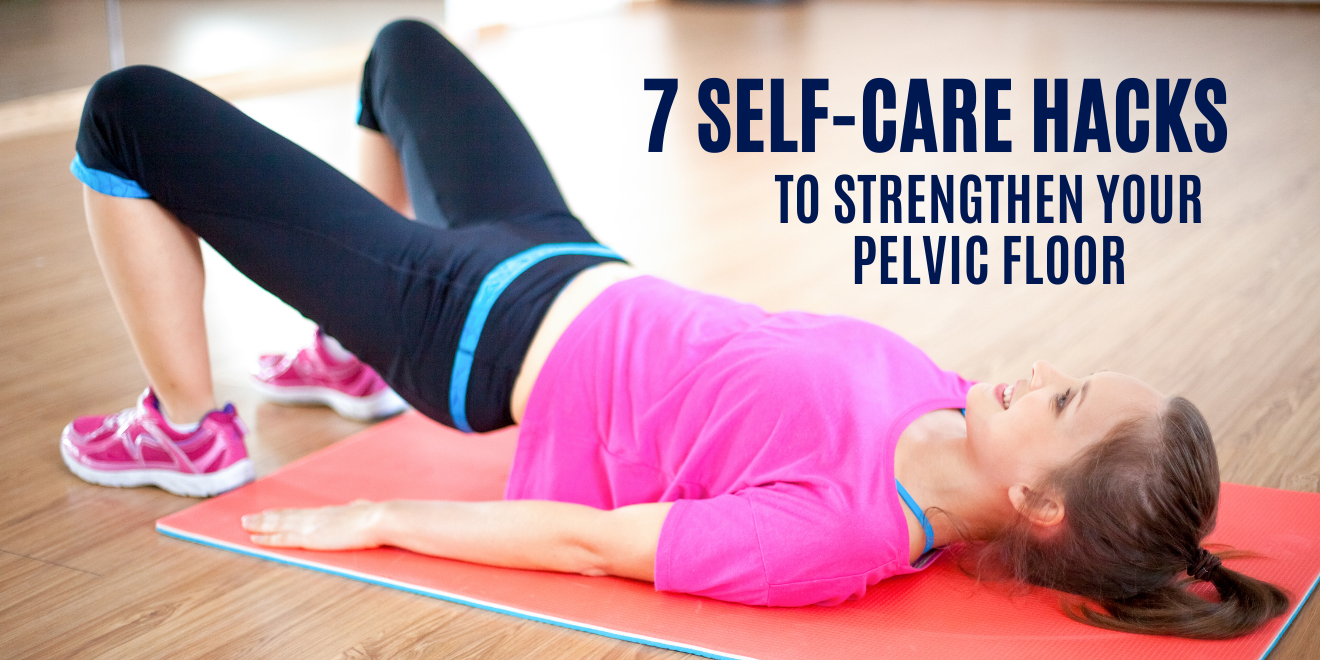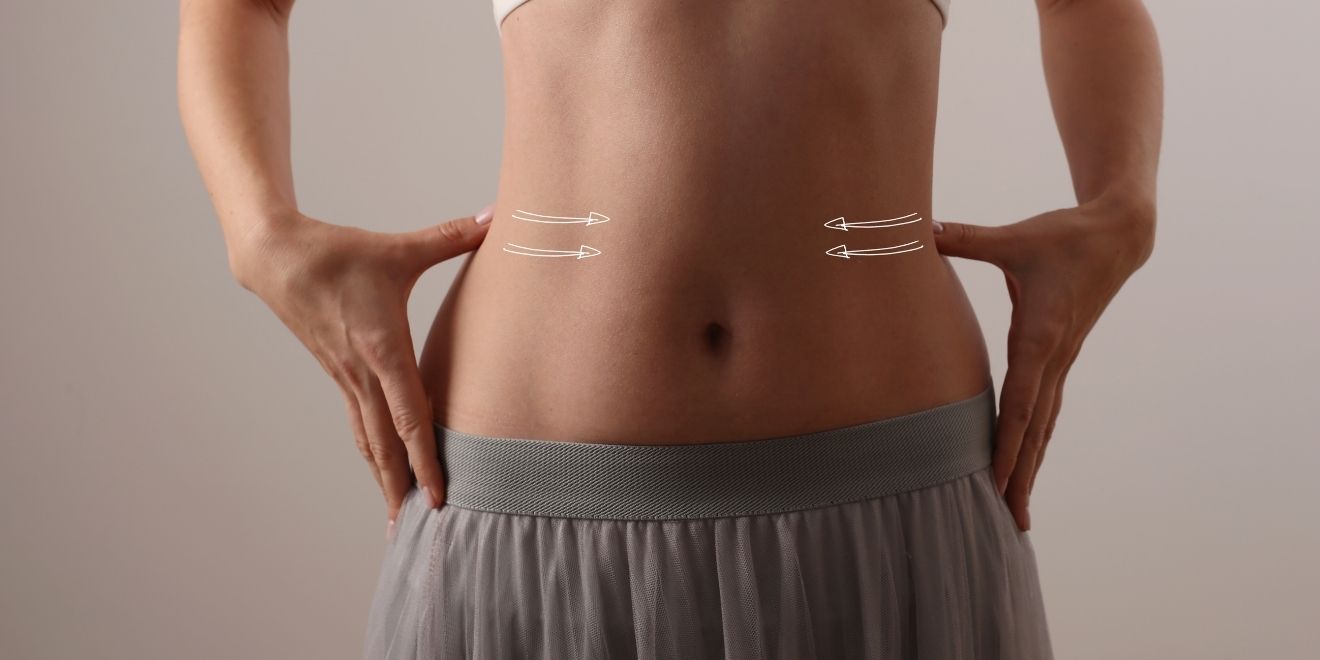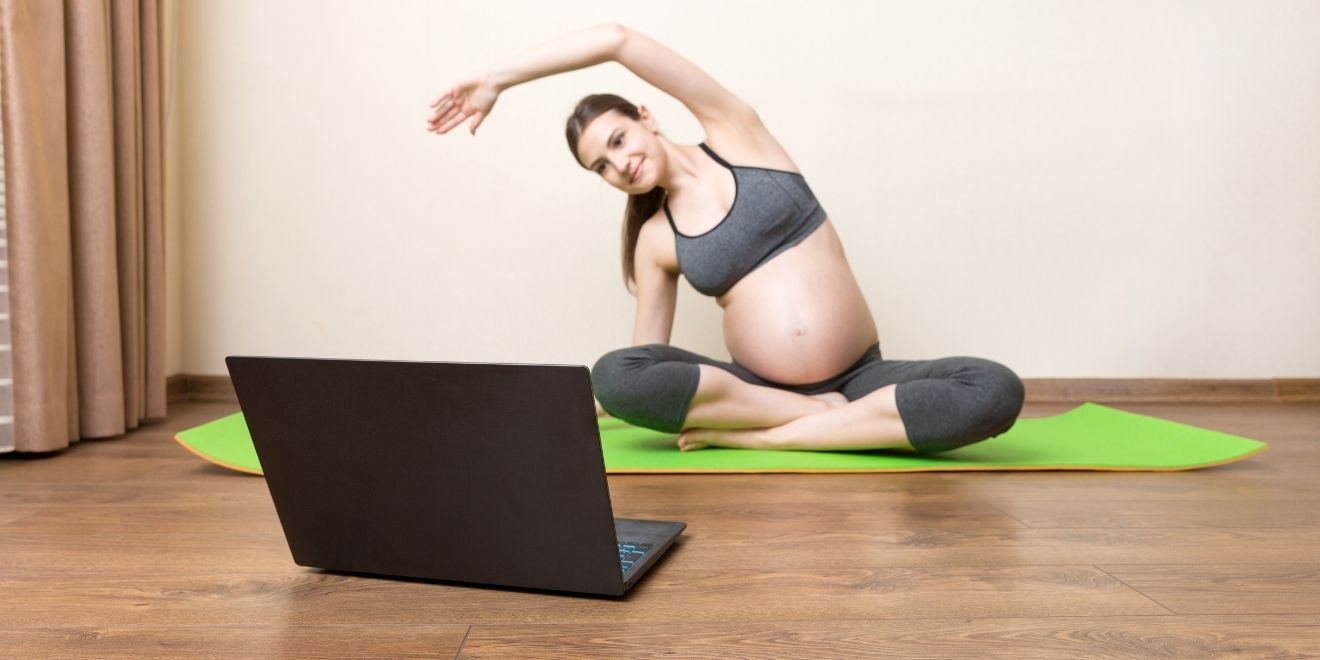7 Self-Care Hacks to Strengthen Your Pelvic Floor

After Having Your Baby-- Women who plan to leave all pregnancy pain and discomfort behind after delivery soon find that postpartum symptoms can be just as severe.
https://www.youtube.com/watch?v=g2Tca-2Lw6g
These symptoms can take their toles in many ways and can last up to 6 weeks or longer. Soreness, depression, bleeding, exhaustion, and constipation are only a few of the undesirable outcomes women may experience after giving birth. One of the most common issues for women is coping with urinary incontinence symptoms in the weeks following childbirth.
The first step in pelvic floor muscle exercises is to identify the right muscles. Many methods can help you accurately distinguish the various parts of the pelvic floor muscles.

One method is to interrupt or slow down the flow of urine in the middle of emptying the bladder. Stopping the flow of urine repeatedly to the toilet is not an exercise but a way to locate the pelvic floor muscles.
Identifying your pelvic floor muscles can only help you determine which muscles are required to regulate the bladder. And to bring consciousness and awareness to that area. If you can, avoid urine flow through the toilet for a second or two, then relax and finish emptying without straining.
This is the most critical aspect of pelvic floor muscle exercise since there is no point in doing it if you don't do it correctly. Here comes visualization.
Imagine letting go as if you were passing the urine or passing wind. Let your stomach muscles hang loose, too. See if you can squeeze in and keep the muscles within the pelvis as you're breathing. Nothing above the belly button should be tightened or tensed.
https://www.youtube.com/watch?v=frLM8rC1nsM
Some discomfort and flattening of the lower part of the wall of the stomach are going to happen. This is not a concern, as this part of the tummy works with the pelvic floor muscles.
Mothers tend to take care of those around them at the expense of their own needs. Self-care is essential for everyone. At no time is caring for your wellbeing more crucial than it is after giving birth.
Now, consider these seven DIY self-care hacks for new mothers to encourage you to take time out for yourself and take care of your healing body while at it.
The beginning of your journey to motherhood is not the time to take on the superwoman role. Lean on your network. Friends and family want to help.
They know it's a hectic time.

Other new moms might be going through the same thing or might have, ask questions, and try to connect with women-centered groups that might help with some advice on this condition (leaking) or others that might arise.
If a loved one asks how they can support you, don't hesitate to let them know. Be honest about the type of assistance you need and what will be most beneficial to you and your family. Easy errands like preparing a meal, helping with household chores, or even helping with nighttime feedings could be useful.
Time management as a new mother can be a difficult task. You probably feel overwhelmed and don't feel like there are enough hours in the day to accomplish anything.
https://www.youtube.com/watch?v=NKl8ImI3OVE
While this may be the case, it's also true that you're going to burn out if you push yourself too hard. Instead, allow yourself some downtime each day to rejuvenate and renew. This will ultimately benefit your new baby and your family, as well as yourself. You'll have more to give to others when you've permitted yourself to recharge.
Take a nap when the baby sleeps or enjoy a nice bath. Put your little one in a bouncy seat so you can read a book or work on a hobby. You'll feel much better when you do.
Being stuck in the house caring for your baby can understandably feel confining. It increases stress levels, and isolation can lead to feelings of sadness or depression. Making the stress double your symptoms. Try to get out of the house regularly.

A good walk can be very energizing and can help loosen those stiff muscles up a bit; it doesn't have to be a strenuous one, walk around your block, the nearest park, or you’re the neighborhood, it will increase your endorphins, and you may even experience the "runners high." Please invite your friends to join in; connecting with them while getting your sweat on is even better.
Connecting with your partner is also essential, and communicating your needs, desires, symptoms, and fears is a great way to receive support and love whenever you need it the most.

New parenthood is stressful for you both. It's easy to drift apart and to let your needs as a couple of falls by the wayside. Scheduling time to reconnect during the week shows that you're committed to your relationship. It allows you to enjoy each other as partners, not just as parents.
Self-care involves taking care of your body as well as your mind and spirit. Getting enough sleep, eating well, and staying active are all critical to overall wellness. Trial and error will help you to figure out how to get the best night's sleep. Perhaps you and your partner can switch off for nightly feedings. Co-sleeping might work well, do your homework, and do some research about trying different methods to improve your sleep.
Eat enough healthy food to provide the nutrition you need, especially if you're breastfeeding. You may be eager to get back to your exercise routine but take care not to overdo it. Some vigorous movements like crunches or sit-ups can be harmful to your post-pregnancy body, especially if you're dealing with a condition such as diastasis recti.

You probably read a lot of pregnancy and baby books before your little one was born. That's a great start. However, there will be circumstances that arise that you won't be prepared for. Don't hesitate to reach out to your community, friends, and medical professionals for assistance. Remember that this is a new experience for you. No one expects you to have all the answers.
Finally, the most important thing to keep in mind is that no parent is perfect. Postpartum blues are a real thing, so that you may be more susceptible than ever to self-criticism. Be gentle with yourself and know that you're doing a fine job. Parenting involves constant learning. Try not to judge yourself for what you don't know. Avoid comparing yourself to others or placing unnecessary expectations on yourself.
https://www.youtube.com/watch?v=g2Tca-2Lw6g
These symptoms can take their toles in many ways and can last up to 6 weeks or longer. Soreness, depression, bleeding, exhaustion, and constipation are only a few of the undesirable outcomes women may experience after giving birth. One of the most common issues for women is coping with urinary incontinence symptoms in the weeks following childbirth.
First Comes First: Where are my pelvic floor muscles
The first step in pelvic floor muscle exercises is to identify the right muscles. Many methods can help you accurately distinguish the various parts of the pelvic floor muscles.

One method is to interrupt or slow down the flow of urine in the middle of emptying the bladder. Stopping the flow of urine repeatedly to the toilet is not an exercise but a way to locate the pelvic floor muscles.
Identifying your pelvic floor muscles can only help you determine which muscles are required to regulate the bladder. And to bring consciousness and awareness to that area. If you can, avoid urine flow through the toilet for a second or two, then relax and finish emptying without straining.
Having the Correct Technique
This is the most critical aspect of pelvic floor muscle exercise since there is no point in doing it if you don't do it correctly. Here comes visualization.
Imagine letting go as if you were passing the urine or passing wind. Let your stomach muscles hang loose, too. See if you can squeeze in and keep the muscles within the pelvis as you're breathing. Nothing above the belly button should be tightened or tensed.
https://www.youtube.com/watch?v=frLM8rC1nsM
Some discomfort and flattening of the lower part of the wall of the stomach are going to happen. This is not a concern, as this part of the tummy works with the pelvic floor muscles.
Mothers tend to take care of those around them at the expense of their own needs. Self-care is essential for everyone. At no time is caring for your wellbeing more crucial than it is after giving birth.
Now, consider these seven DIY self-care hacks for new mothers to encourage you to take time out for yourself and take care of your healing body while at it.
One: Look for And Accept Help
The beginning of your journey to motherhood is not the time to take on the superwoman role. Lean on your network. Friends and family want to help.
They know it's a hectic time.

Other new moms might be going through the same thing or might have, ask questions, and try to connect with women-centered groups that might help with some advice on this condition (leaking) or others that might arise.
If a loved one asks how they can support you, don't hesitate to let them know. Be honest about the type of assistance you need and what will be most beneficial to you and your family. Easy errands like preparing a meal, helping with household chores, or even helping with nighttime feedings could be useful.
Two: Set Aside Time to Practice Your Exercises
Time management as a new mother can be a difficult task. You probably feel overwhelmed and don't feel like there are enough hours in the day to accomplish anything.
https://www.youtube.com/watch?v=NKl8ImI3OVE
While this may be the case, it's also true that you're going to burn out if you push yourself too hard. Instead, allow yourself some downtime each day to rejuvenate and renew. This will ultimately benefit your new baby and your family, as well as yourself. You'll have more to give to others when you've permitted yourself to recharge.
Take a nap when the baby sleeps or enjoy a nice bath. Put your little one in a bouncy seat so you can read a book or work on a hobby. You'll feel much better when you do.
Three: Get Moving and Get Out of The House
Being stuck in the house caring for your baby can understandably feel confining. It increases stress levels, and isolation can lead to feelings of sadness or depression. Making the stress double your symptoms. Try to get out of the house regularly.

A good walk can be very energizing and can help loosen those stiff muscles up a bit; it doesn't have to be a strenuous one, walk around your block, the nearest park, or you’re the neighborhood, it will increase your endorphins, and you may even experience the "runners high." Please invite your friends to join in; connecting with them while getting your sweat on is even better.
Four: A Date Night Is Always a Good Idea
Connecting with your partner is also essential, and communicating your needs, desires, symptoms, and fears is a great way to receive support and love whenever you need it the most.

New parenthood is stressful for you both. It's easy to drift apart and to let your needs as a couple of falls by the wayside. Scheduling time to reconnect during the week shows that you're committed to your relationship. It allows you to enjoy each other as partners, not just as parents.
Five: Care for Your Physical Needs
Self-care involves taking care of your body as well as your mind and spirit. Getting enough sleep, eating well, and staying active are all critical to overall wellness. Trial and error will help you to figure out how to get the best night's sleep. Perhaps you and your partner can switch off for nightly feedings. Co-sleeping might work well, do your homework, and do some research about trying different methods to improve your sleep.
Six: Make sure to nourish your body
Eat enough healthy food to provide the nutrition you need, especially if you're breastfeeding. You may be eager to get back to your exercise routine but take care not to overdo it. Some vigorous movements like crunches or sit-ups can be harmful to your post-pregnancy body, especially if you're dealing with a condition such as diastasis recti.

Seven: Take Time to Learn
You probably read a lot of pregnancy and baby books before your little one was born. That's a great start. However, there will be circumstances that arise that you won't be prepared for. Don't hesitate to reach out to your community, friends, and medical professionals for assistance. Remember that this is a new experience for you. No one expects you to have all the answers.
Finally, the most important thing to keep in mind is that no parent is perfect. Postpartum blues are a real thing, so that you may be more susceptible than ever to self-criticism. Be gentle with yourself and know that you're doing a fine job. Parenting involves constant learning. Try not to judge yourself for what you don't know. Avoid comparing yourself to others or placing unnecessary expectations on yourself.




































































































